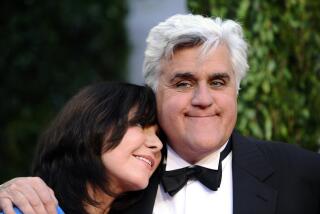Arnold Schwarzenegger discusses affair in interview
SACRAMENTO — Arnold Schwarzenegger said he realized he was the father of his housekeeper’s child when the boy reached age 7 or 8 and the resemblance became apparent.
Although he never discussed the matter with the boy’s mother, who kept the child’s paternity secret while continuing to work in the home of Schwarzenegger and his wife, Maria Shriver, he began secretly sending the woman extra money to help care for his son.
Those details, revealed during an interview with CBS News’ Lesley Stahl on “60 Minutes” on Sunday, were the former governor’s first public comments on the affair that grabbed headlines and destroyed his marriage last year. They came a day before the release of Schwarzenegger’s new memoir, which is expected to delve into details of his relationship with Mildred Baena and their son, Joseph.
PHOTOS: Arnold Schwarzenegger and Maria Shriver
Schwarzenegger’s decision to handle the paternity issue without telling those closest to him about it is characteristic of the former bodybuilding champion, movie star and politician, who said a certain amount of denial and secrecy has been a key to his success.
“That’s the way I handle things, and it always has worked,” Schwarzenegger said, according to a transcript provided by CBS before the interview aired on the West Coast. “It’s not the best thing for people around me.... Some information I just keep to myself.”
Shriver confronted Schwarzenegger about the child in a counseling session the day after he left office, in January 2011. She filed for divorce weeks later.
Schwarzenegger declined to discuss his current relationship with the boy but said he continues to give financial support to him and his mother.
While the affair with Baena remained private until after Schwarzenegger left office, allegations of lewd behavior and infidelity rocked Schwarzenegger’s campaign for governor just days before he was elected in the historic recall of Democratic Gov. Gray Davis.
Schwarzenegger told Stahl that campaign almost never happened. When he told Shriver, niece of former President John F. Kennedy, of his intention to run just four days before making the surprise announcement on NBC’s “The Tonight Show With Jay Leno,” Schwarzenegger said, “she started shaking, and she had tears in her eyes.
“I realized that I was stepping into something that was much deeper than just me running and her being a supportive wife,” he said.
Shriver’s mother, the late Eunice Kennedy Shriver, intervened, telling her daughter that if she got in the way of Schwarzenegger’s political ambitions, he would never forgive her.
Shriver wasn’t the only one down on her husband’s gubernatorial ambitions, according to outtakes from the interview on the “60 Minutes” website. Schwarzenegger said he met with Karl Rove in the White House in 2003, and Rove was “dismissive” of the recall and the Hollywood star’s chances of winning. Rove arranged a quick meeting for Schwarzenegger with Condoleezza Rice, whom Rove said was the White House’s pick for California governor in 2006, the year Schwarzenegger was reelected.
Also in the outtakes, Schwarzenegger says he foolishly wanted to rewrite his famous “Terminator” line, “I’ll be back,” to “I will be back.” He found the contraction “feminine.” He fought “tooth and nail” over it with director James Cameron, but Cameron resisted.
Sunday’s interview was short on policy but touched briefly on Schwarzenegger’s unsuccessful push to expand healthcare coverage to millions of uninsured Californians, which he characterized as an improvement on the plan passed by Mitt Romney when Romney was governor of Massachusetts.
With his movie career now back in full swing, an academic think tank launched in his name recently at USC and a nationwide book tour in the offing, Schwarzenegger is focusing on his future. But he said the affair with Baena, and the pain it caused his family, continues to be his greatest regret.
“That,” he said, “is something that I will always look back and say, ‘How could you have done that?’”
More to Read
Get the L.A. Times Politics newsletter
Deeply reported insights into legislation, politics and policy from Sacramento, Washington and beyond. In your inbox three times per week.
You may occasionally receive promotional content from the Los Angeles Times.










